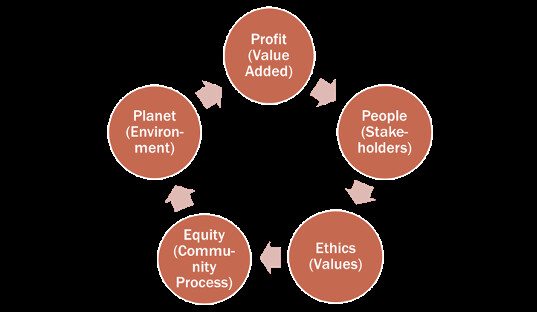Kelly O’Brien and Shyam Kamath
This is the first part of a multi-part series on the core curriculum concept of responsible business at California State University, Monterey Bay.
Responsible business is a core concept at the College of Business at CSUMB and describes how the next generation (and many of the current generation) of 21st century businesses operate. What are the key characteristics of responsible business? How is responsible business different from corporate social responsibility?
Profit, People, Planet, Ethics, and Equity
Simply put, responsible business is the practice of creating customer value through the active concern for people, ethics, equity, and environmental impacts while running a profitable business. The Quintuple Bottom Line (QBL) of Responsible Business is described by the words Profit, People, Planet, Ethics, and Equity (Triple 'P', double 'E').
By focusing on Profit, a business ensures it is financially sustainable. Without generating a profit, a business cannot survive or thrive, so the primary role of a responsible business owner is to ensure that the business returns a profit and provides income to survive and grow. Unless it makes a profit, the business cannot fulfill the other four aspects of the QBL.
By paying attention to People, a business focuses on its employees, suppliers, and customers. Employees are the key group that make the business function and enable it to create value-added. Satisfied, happy, and productive employees are the lifeblood of a successful business. They deserve good wages, meaningful employment, and the means to sustain their families and live meaningful lives. Suppliers are key because they enable the business to obtain inputs that are goal-effective and cost-effective in order to generate value. Customers create the demand for its products and deserve safe, high quality, and high value products and services.
Planet refers to the responsibility of the business to operate in ways that minimize the harm to the environment and the planet, through its actions. It treats the natural environment as a finite resource, which must be sustained and respected. Environmental degradation and destruction leads to a situation in which business itself is no longer sustainable.
Ethics is a code by which a business abides, which includes legal, moral, and values-based considerations that guide business behavior. Ethics includes operating with integrity and in a transparent manner; that is, “doing it right” with nothing to hide. “Do right to do good” is the guiding principle of responsible business.
With regard to community, Equity requires that a responsible business acts in a way that provides for the health of the community in which it operates, providing local employment for its citizens, providing programs that help the needy and the underrepresented, and, in general, building a sense of equitable community. These actions reflect the responsibility of contributing to the improvement of the quality of life in the communities in which it operates and for acting in a manner that ensures the equity of the process to everyone it touches.
Stakeholder Capitalism and Shared Value
Responsible business derives its roots from the concept of the stakeholder approach. The stakeholder approach looks at the societal entities which a business effects through its activities but also upon which it depends. These stakeholders include, in addition to the stockholders as owners and primary beneficiaries, the employees, customers, the community in which the business operates and nature writ large. The concept of responsible business takes into account the impacts of the business on all these constituent stakeholders by focusing the business on the QBL.
The theory of stakeholder capitalism is not new. Michael Porter and Mark Kramer of Harvard Business School addressed the issue in their 2011 article entitled ”Creating Shared Value: How to Reinvent Capitalism—and Unleash a Wave of Innovation and Growth,” published in the Harvard Business Review,. In their seminal article, the authors offered their point of view as to the path forward:
“Corporate policies and practices that enhance the competitive advantage and profitability of the company while simultaneously advancing social and economic conditions in the communities in which it sells and operates. Shared value is not corporate social responsibility, philanthropy, or even sustainability, but a new way to achieve economic success”.
The responsible business concept goes beyond the shared value concept by explicitly bringing in values and the concern for process equity in order to serve the stakeholders of the business. A responsible business, thus, alludes to or expresses its values in its purpose for being in business. Moreover, out of its purpose springs its method of operating by the principles of the quintuple bottom line.
Responsible Business vs. Corporate Social Responsibility
What is the difference between the responsible business approach and the traditional corporate social responsibility approach to business? In its essence, the corporate social responsibility approach has three main tenets: compliance with community standards, good corporate citizenship, and the adoption of sustainability initiatives focusing on the triple bottom line of Profit, People, and Planet. The responsible business approach goes beyond to make the QBL a central tenet of the business model and business strategy by focusing on ethical values, and societal and environmental well-being, as integral to the purpose of a business while generating people-centered profits.
Patagonia founder Yvon Chouinard and Vincent Stanley in their remarkable book, The Responsible Company (2012) described such a business in the following way:
“How is a company responsible? Should it profit its shareholders, provide for the well-being of its employees, make excellent products, be a good force in the community. And protect nature? We think that a responsible company bears all these obligations. A responsible company owes a return not only to its stockholders but to something that has come to be called stakeholders…”
Responsible Business and the Quintuple Bottom Line
At the College of Business at California State University Monterey Bay, we believe that not only companies but also business schools must take the lead in bringing forth a new view of responsible business capitalism. The responsible business approach defines a vision that creates Responsible Business Value (RBV) for stakeholders (see the diagram below) by using the concept and tool of the quintuple bottom line.

Become a responsible business leader
A strong commitment to responsible business can protect and enhance a company’s brand, create a more positive working environment, boost profits, and attract top-tier talent. Consider how an Online MBA from California State University, Monterey Bay, with its focus on responsible business, can offer you the professional business competencies valued by employers in today's global marketplace.
About the Authors
Kelly O’Brien
CEO, Tendaji, LLC, and Executive in Residence, College of Business, California State University, Monterey Bay

Kelly Erin O’Brien is CEO of Tendaji, LLC, a woman-owned, employee-driven consultancy based in Carmel Valley, California. Tendaji aspires to fulfill its core principles of responsible business: Profit, Customer Service and Employee Equity, Respect for the Environment, Community Service, and Transparency in Governance. Continuous improvement is a key process in the company’s approach to operations. “Tendaji” is a Swahili expression, meaning “makes things happen”. O'Brien was a founding partner and Chief Operating Officer of Sensortech Services LLC, a medical device logistics and program management services company. O’Brien’s career includes Environmental Engineering Research and Management for the University of Santa Clara, New United Motor Manufacturing Inc, and FMC Corporation, San Jose, CA. As founding partner and Chief Information Systems Officer of Gaia Systems, Portola Valley CA, O’Brien designed and developed Environmental Management GIS software and introduced two commercial products into the market. Between 1990 and 1996, O’Brien taught Environmental, Health and Safety Management at University of California, Berkeley and Santa Cruz Extension, Foothill – DeAnza Community College District, Cupertino, CA, Merritt College, Oakland, CA, Mission College, Santa Clara, CA, and the Community College of San Francisco. She is past President of the Board of Directors of KUSP 88.9 FM, Central Coast Public Radio, and a former on-air host of Life in the Fast Lane, a program that highlighted technologies that may lower dependence on fossil fuels. O’Brien holds a Master of Liberal Arts (ALM in Sustainability and Environmental Management from Harvard University and a Master of Business Administration with honors from the W.P. Carey School of Business at Arizona State University. She is currently pursuing a masters-level program in Global Business at Oxford University, Saïd Business School, Oxford, UK. She hopes to pursue a DPhil (PhD) at Oxford in Higher Education with a focus on responsible business.
Shyam Kamath
Dean and Professor of Global Business and Economics,
College of Business, California State University, Monterey Bay

Shyam Kamath, Ph.D., is an internationally recognized scholar and educator who has gained recognition as a global innovator and expert in the areas of international economics, business management, and business program innovation. He has more than 35 years of experience in international education management, international economic development and management, sustainable enterprise formation, global business consulting, and university teaching. His distinguished career has also focused on building programs and institutions that benefit those who are underserved and underrepresented while focusing on economic opportunity and community building. Dr. Kamath is the founding Dean of the College of Business at CSU, Monterey Bay and has held academic and administrative positions at leading universities in the U.S., Canada, Asia and Europe. He is the recipient of numerous teaching and research awards and multiple outstanding professor and educator awards. Previously, he was an entrepreneur as a co-founder of three start-ups has pioneered a number of academic start-ups and has worked for a national government agency and leading international firms in the energy equipment and consumer goods industries. He has been a consultant to four governments and over 100 companies and non-profits worldwide. He has published over 80 articles in leading peer-reviewed scholarly and trade journals and is the author or co-author of three books. Dean Kamath serves on the boards/advisory councils of the Monterey Peninsula Chamber of Commerce, Rancho Cielo, the HOPE Collaborative (Boston, MA), MBEP’s Techno-economic Committee, Whalefest Monterey Bay, Hartnell College Foundation’s Strategic Planning Committee and CSUMB’s College of Business Advisory Council and Sustainable Hospitality Management Council. He also serves on the advisory board of the for-profit company, LeaderJam as well as the CEO of a Monterey-based non-profit organization. His previous board experience includes serving on the board of a number of technology companies.
- Retrieved on February 18, 2020, from content.time.com/time/specials/packages/completelist/0,29569,1988080,00.html
- Retrieved on February 18, 2020, from forbes.com/sites/abdoriani/2019/10/24/11-surprising-and-insightful-statistics-about-startups

